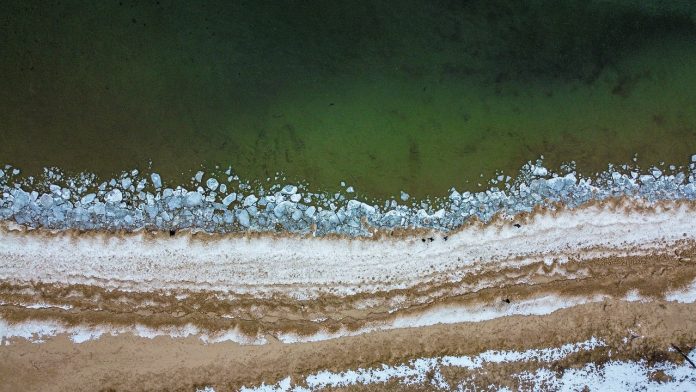A recent article in The Guardian, “Vanishing ice and snow: record warm winter wreaks havoc across US Midwest,” describes the very mild winter much of the American Midwest has experienced this year, claiming that it is due to climate change. While a declining trend towards less-severe winters may in part reflect modest warming, the intensity of this winter’s warmth is more likely explained by El Niño.
The Guardian asserts that ice cover across the Great Lakes has been declining since the early 1970s, writing that while the historic average for mid-February is around 40%, “this year it was about 4%.” Grand Forks, North Dakota; Milwaukee, Wisconsin; and Minneapolis-St Paul, Minnesota, are listed as having recorded their warmest winter, and the Guardian links to evidence in the form of an article from weather.com. Interestingly, directly beneath the states listed in the weather.com post referenced in the article is this statement, “[t]he Twin Cities’ warmest winter, by the way, was 146 years ago in 1877-78, when Rutherford B. Hayes was president.” The Guardian neglected to mention that.
Climate change is the culprit, claims The Guardian, but their own weather.com source lists two natural causes for this year’s mildness, including El Niño and a lack of “persistent blocking patterns – such as the Greenland block – that pull cold air from Canada and lock it into the U.S. for longer than a few days.”
Regarding El Niño, weather.com says “[w]armer winters are typical across the northern tier of states during a strong El Niño.”
Continuing, weather.com reports:
Despite a few recent storms, this season’s winter storm pace across the country is the slowest in 10 years. That’s left just 14% of the Lower 48 covered by snow as of Feb. 26. The warmth also left Great Lakes ice cover at a 51-year low for mid-February, including an ice-free Lake Erie and just a few small bays of Lake Superior with any ice.
In case you missed the point, the ice was this low 51 years of global warming ago, when the Earth was not only cooler, but it was in a cooling trend. A recent post at Climate Realism covers this specific subject in more detail, with H. Sterling Burnett writing “the last time the Great Lakes ice coverage was this low in January was in the early 1970s, a time when global average temperatures were cooling, which many scientists claimed at the time could be a sign of a coming ice age.”
In fact, ice coverage data for the Great Lakes show that coverage is highly variable from year to year. Plotted annual maximum data from the National Oceanic and Atmospheric Administration’s Great Lakes Environmental Research Laboratory show as much. (See figure below)

The data across all the Great Lakes do indicate that recent years have seen more below-average years, but high years are still found, and it depends on the individual lake. On Lake Superior, Erie, and Huron, for example, most winters touch the 90% ice coverage range. On Lake Michigan, which has lower ice coverage averages, the record ice coverage is tied between two years; 1977 and 2014. Lake Ontario likewise traditionally has less coverage, and has its record high in 1979, and second-highest ice coverage in 2015.
The Guardian also says that a “report published in January found that the number of -35F (-37.2C) readings in northern Minnesota have fallen by up to 90%,” they point out that low temperatures play a role in weed and pest control, which is true enough, however they neglect to mention that extreme cold kills human beings as well, and at much higher rates than extreme heat does. They also fail to mention that longer, colder winters result in fewer crop rotations and production.
In Climate at a Glance: Temperature Related Deaths, multiple studies back up the fact that cold is deadlier than heat all around the world. One study, published in the Lancet in 2021, found that while 600,000 people die globally from heat, over 6 million die from cold. (see the figure, below) Further, cold related deaths have declined at more than double the rate that heat related deaths have increased.
The table below provides some of the temperature related death numbers.
| COLD RELATED DEATHS BY REGION | HEAT RELATED DEATHS BY REGION |
| Africa 1.18 million | Africa 25,550 |
| Asia 2.4 million | Asia 224,000 |
| Europe 657,000 | Europe 178,700 |
| South America 116,000 | South America 25,250 |
| UK 44,600 | UK 8000 |
| US 154,800 | US 18,750 |
| China 967,000 | China 71,300 |
| India 655,400 | India 83,700 |
| Australia 14,200 | Australia 2300 |
| Total: 6,189,000 | Total: 637,550 |
Table 1. Global cold related deaths vs. heat related deaths from 2000 to 2019. Data source: Monash University press release.
The number of severely cold winters may be modestly trending downwards around the Great Lakes and across portions of the American Midwest, but almost everyone would agree that fewer -35℉ days is a blessing not a curse. This year’s winter is particularly mild not because of climate change but because of natural weather patterns, and a long-term trend in declining extreme cold is actually better for human survival. Contrary to The Guardian’s reporting, climate doomsaying is not an appropriate response to the available data.















These people are never happy regardless of the conditions! I guess they don’t care! As long as their money keeps coming for them to print such useless information that has no basis of truth! Surprised they didn’t use the excuse of fossil fuel as the culprit! Their tireless rhetoric on climate change has just about destroyed any credibility they might have ever had! I’m sure they’re out to retract their statement that they were wrong about the fact climate change is responsible!